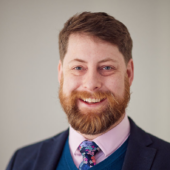For the past six months OII Research Fellow, Dr Bernie Hogan, has been a scientific mentor to A-level student Nina Jones, a finalist of the BBC Radio 4 project, So You Want To Be A Scientist?
 BBC Radio 4’s weekly science show, Material World, set out to give non-scientists a chance to turn ideas into real life experiments and in the process find the Amateur Scientist of the year. Out of more than 1300 applicants, four projects were turned into real-life experiments.
BBC Radio 4’s weekly science show, Material World, set out to give non-scientists a chance to turn ideas into real life experiments and in the process find the Amateur Scientist of the year. Out of more than 1300 applicants, four projects were turned into real-life experiments.
Finalist Nina Jones is currently exploring the question: What makes up a typical Facebook profile picture? She hypothesises that adults choose pictures showing an event in their lives – their wedding, or a photo with their children – whereas teenagers seem to show themselves having a good time, often with friends at a party. She will test these predictions, guided by her scientific mentor for the project, Dr Bernie Hogan.
Bernie Hogan’s research at the Oxford Internet Institute focuses on personal relationships across social media. In particular, he is exploring ways to visualize and interpret social groups that people interact with in daily life. He looks at how people cope with competing social demands, and how they manage in a world of social information overload. More about Bernie Hogan’s work.
Throughout the official mentoring process Bernie has helped Nina towards a greater objectivity in exploring her questions. He says: “The original experiment focused on discrepancies between ‘real life’ images and carefully selected ‘attractive’ online images. It was too subjective. We are now exploring ways to code profile pictures using a standardized coding scheme coupled with a survey. The profile picture is the only photo that is public-by-default, and thus it is now the closest image to one’s pure ‘public face’. We hypothesize that younger people are more self-focused, while older individuals focus on their network (through pictures of children, culture and pets).”
Nina has just completed a survey through the ‘BBC Profile Picture’ fanpage on Facebook. The page currently has approximately 3600 fans, almost half of whom have filled out the profile survey. The survey was done as a SurveyMonkey survey embedded in a Facebook application, thereby making it possible to automatically link the profile picture to the survey responses. Nina and some of her school friends are currently coding these photos for cues such as ‘alone’, ‘with friends’, ‘tourism’, which will be related to the survey results.
Bernie believes that Nina has some stiff competition from the other finalists, but that it’s key that she focuses on doing quality scholarly research first and foremost. He said: “I want to hear Nina make a claim about people’s profile photos that does two things: First it should tell people something that they might not have known, expected, or learned without research. Second, it should inspire others to take up where this study leaves off.”
Read full interview with Bernie Hogan (BBC website)
Listen to Nina explain her ideas (BBC website)
Listen to Nina and Bernie discuss the project (Material World, BBC Radio 4)
The other project finalists are exploring (with their own scientific mentors) whether there is a ‘homing distance’ for snails, the location of maximum crowd density in music gigs, and the frequency and brightness of noctilucent clouds. In September 2010 all four finalists will present their results at the British Science Festival in Birmingham, where the judges will choose a winner. They will write up their results and submit their paper to a respected science journal for peer review.
The experiment judges are Prof Lord Robert May (former Chief Science Adviser for UK Government), Prof Tanya Byron (Clinical Psychologist, author and broadcaster), Mark Henderson (Science Editor of The Times) and Prof Trevor Cox (Acoustic Engineer, EPSRC Media Fellow).

 BBC Radio 4’s weekly science show, Material World, set out to give non-scientists a chance to turn ideas into real life experiments and in the process find the Amateur Scientist of the year. Out of more than 1300 applicants, four projects were turned into real-life experiments.
BBC Radio 4’s weekly science show, Material World, set out to give non-scientists a chance to turn ideas into real life experiments and in the process find the Amateur Scientist of the year. Out of more than 1300 applicants, four projects were turned into real-life experiments.